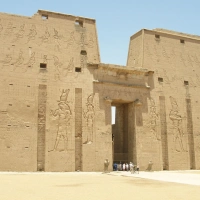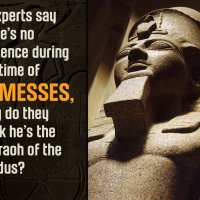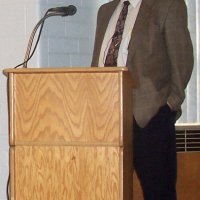An astounding event at the Tower of Babel over 4,000 years ago made language translation necessary today.
The History Book of the Universe records a remarkable series of events. Noah’s family disembarked from the Ark after the Great Flood (Genesis 6:1-9:19) around 2500 BC. God clearly instructed Noah and his sons to “Be fruitful and multiply, and fill the earth.” (Genesis 9:1,7)
Did Noah’s descendants listen to God? No, the clan settled on the plain of Shinar. They made no attempt to spread out and fill the earth. On the contrary, they stuck together to build a Tower, defying God’s order to re-populate the earth. Yahweh therefore confused the language of the Tower builders to force them to scatter across the face of the earth (Genesis 11:1-9).
When Did Yahweh Scramble Language at Babel?
It was not too long after the Flood, because the world’s entire population was still together on the plain of Shinar. There hadn’t been time for the population to grow so large that it needed more land areas on which to live. Yet some years had passed because the population had grown large enough to develop a city and large enough to undertake the mammoth construction project of building “a tower whose top will reach into heaven.”
A key clue about when language was scrambled is the naming of Eber’s son Peleg (Genesis 10:25; 1 Chronicles 1:19). Peleg means division, and “division” is the reason given for his name: “…in his days the earth was divided.” Whatever the “division” was, it was certainly a big event. Peleg is the only one in the Genesis 10 Table of Nations for whom the meaning of his name is given. This indicates that his name commemorated an event of major significance.
I think Peleg’s Division refers to the dispersal of the world’s population after Yahweh “confused the language of the whole earth.” Then from Babel Yahweh “scattered them abroad over the face of the whole earth.” (Genesis 11:9)
The reason I think Peleg’s Division of Genesis 10:25 refers to Babel is because this reference to Peleg is in the midst of a chapter discussing the division of the nations. Division is mentioned both at the beginning and at the end of the chapter, thereby setting the context for Peleg’s Division in between:
By these were the isles of the Gentiles divided in their lands; every one after his tongue, after their families, in their nations. (Genesis 10:5)
And two sons were born to Eber; the name of the one was Peleg, for in his days the earth was divided; and his brother’s name was Joktan. (Genesis 10:25)
These are the families of the sons of Noah, after their generations, in their nations: and by these were the nations divided in the earth after the flood. (Genesis 10:32)
The context is also one of division of family lines according to language or tongue:
By these were the isles of the Gentiles divided in their lands; every one after his tongue, after their families, in their nations. (Genesis 10:5)
These are the sons of Ham, according to their families, according to their languages, by their lands, by their nations. (Genesis 10:20)
These are the sons of Shem, according to their families, according to their languages, by their lands, according to their nations. (Genesis 10:31)
The Table of Nations of Genesis 10 lists some of the main family lines that were at Babel and that were divided there. It describes a division of family lines by languages. The reader naturally wonders “Why?” and “How?” did Noah’s one-language family break up into multiple clans speaking different languages. The Tower of Babel account in Genesis 11 follows naturally with the explanation. (There is no chapter break in the original Hebrew.)
These are the families of the sons of Noah, after their generations, in their nations: and by these were the nations divided in the earth after the flood. Now the whole earth used the same language and the same words. And it came to pass, as they journeyed from the east, that they found a plain in the land of Shinar; and they dwelt there. (Genesis 10:32-11:2)
Thus the context of Peleg’s Division in Genesis 10 & 11 is linguistic division — dividing into family groups according to their tongues. This is what happened at Babel. This is why I think Peleg’s Division is the confusion of tongues at Babel.
The confusion of tongues at Babel (Peleg’s Division) must have been near Peleg’s birth because names are given at birth, not later in life. Also Peleg’s ancestors Noah, Shem, Arpachshad, Shelah, and Eber all outlived Peleg. If Babel occurred later in Peleg’s life, there’s no reason to associate it with him more than with one of those other living ancestors or with one of his descendants Reu, Serug, Nahor, Terah, and Abraham, since all their lifespans overlapped Peleg’s lifespan.
The first-century Jewish historian Josephus said of Peleg,
“He was called Phaleg, because he was born at the dispersion of the nations to their several countries; for Phaleg among the Hebrews signifies division.”
(See Josephus, Antiquities of the Jews Book 1, Chapter 6, Section 4).
Evidently Nimrod, a descendant of Ham, was older than Peleg, a descendant of Shem. Peleg was the son of Eber, who was the son of Shelah, who was the son of Arpachshad, who was the son of Shem. Nimrod, the world leader at Babel, was the son of Cush who was the son of Ham. Thus Ham’s descendant Nimrod was in the same generation as Shem’s descendant Shelah, grandfather of Peleg.
Peleg was born 101 years after the Flood ended and 191 years before Abraham’s birth (Genesis 11:10-26). Nimrod could easily have been 70 years old at this point and well-established as the world leader.
Thus I believe the Scrambling of Tongues at Babel occurred about a century after Noah’s Flood.
Archbisop Ussher (1581–1656) proposed that Peleg’s Division was Noah’s division of the earth among his grandchildren in an effort to disperse them as God had commanded. However, they all subsequently moved to Shinar, where they resisted dispersion by building the city and tower of Babel. This is a plausible understanding of Peleg’s Division, but less likely in my opinion. Noah’s presumed attempt to divide the land among his descendants does not seem a significant enough event to warrant naming a child to commemorate it. Why would Eber want to name a son to commemorate a dispersal command that he resisted?
Ussher estimated the date for the Tower of Babel to be 106 years after the Flood. He based this on the Genesis genealogies and on Egyptian historian Manetho’s statement (3rd century BC) that the confusion of language at Babel occurred in the fifth year of Peleg’s life.
Some think Peleg’s Division refers to the breaking up of a single land mass after the Flood into today’s continents. Even if such a break-up did occur, it’s more likely to have happened during the Flood, or possibly at the end of the Flood year when “the mountains rose up and the valleys sank down” for the Flood waters to drain off the earth (Psalm 104:6-9).
Since Noah’s Ark landed on the mountains of Ararat (Genesis 8:4-5) a century before Peleg, continents had apparently already collided to uplift the mountains ranges. The collision of the Arabian plate with the Eurasian plate had already pushed up Ararat.
Given the Genesis 10 context of Peleg’s Division, the most reasonable understanding is that it is the division of earth’s population into languages, families, and nations which occurred at Babel. This occurred around 2400 BC, about a century after the Flood. Ussher’s chronology is slightly different; he dates the Flood at 2348 BC and the Tower of Babel at 2242 BC.
The Tower of Babel was a mammoth edifice. It was the site of a pivotal event of world history. Its consequences cascade down through the centuries to our own day. Have you ever struggled to learn another language, or to understand someone with a heavy foreign accent? Have you ever felt confused or bewildered in a place with an unfamiliar language? You can credit your rebellious ancestors at the Tower of Babel for causing your troubles.
Soli Deo Gloria.
This is the fourth post in the Tower of Babel series.
Read the prequels:
1. Tower of Babel & Language Translation
2. Tower of Babel – Where?
3. Tower of Babel – What Did It Look Like?
Subsequent posts will suggest answers to intriguing questions about the Tower of Babel:
What was the common language at Babel?
How many languages did Yahweh create at Babel?
How is Babel a major problem for evolutionists?
Read the sequel:
5. Tower of Babel – Origin of Languages
The Translation Page which prompted this series offers automatic translations of the Bible-Science Guy Blog into over 60 languages!
Subscribe – Don’t miss future blog posts!
Click the sidebar’s “SUBSCRIBE” button to follow the
Bible-Science Guy Blog. You’ll automatically receive
new posts free by email. Click SUBSCRIBE NOW!
©William T. Pelletier, Ph.D.
“contending earnestly for the faith”
“destroying speculations against the knowledge of God”
(Jude 1:3; 2 Cor 10:4)
Wednesday April 3, 2013 A.D.
Now the whole earth used the same language and the same words. And it came about as they journeyed east, that they found a plain in the land of Shinar and settled there. And they said to one another, “Come, let us make bricks and burn them thoroughly.” And they used brick for stone, and they used tar for mortar. And they said, “Come, let us build for ourselves a city, and a tower whose top will reach into heaven, and let us make for ourselves a name; lest we be scattered abroad over the face of the whole earth.” And the LORD came down to see the city and the tower which the sons of men had built. And the LORD said, “Behold, they are one people, and they all have the same language. And this is what they began to do, and now nothing which they purpose to do will be impossible for them. “Come, let Us go down and there confuse their language, that they may not understand one another’s speech.” So the LORD scattered them abroad from there over the face of the whole earth; and they stopped building the city. Therefore its name was called Babel, because there the LORD confused the language of the whole earth; and from there the LORD scattered them abroad over the face of the whole earth. (Genesis 11:1-9)






























Who wrote the history book of the universe -amazon lists 1000 – thanks
Have a nice day – Joanne
LikeLike
By: Mystuffinthemail1952@gmail.com on April 3, 2013
at 6:47 am
After the Tower of Babel and the people were given different languages and went their own way, is it possible that is why so many area have they same type of building constructions?
LikeLike
By: Sandra K K Wilson on October 27, 2017
at 3:30 pm
Yes, very likely.
LikeLike
By: BibleScienceGuy on March 7, 2018
at 10:32 am